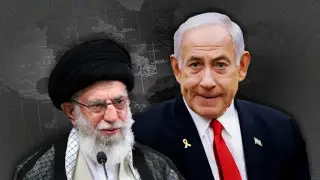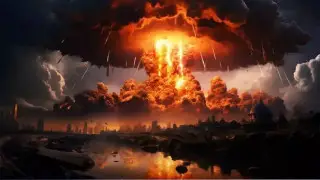
Attack on Anchor (Social Media)
International News: On the fourth consecutive day of heavy conflict, tensions between Israel and Iran have reached alarming new heights. Early Sunday morning, Israel launched a powerful missile strike aimed directly at Iran’s national broadcasting center—an action seen as a deliberate move to disrupt the country's communication channels. The immediate suspension of live programming on Iranian state television following the attack reflected both the precision of the strike and the growing intensity of the war. This act has been widely interpreted as Israel’s shift towards targeting not only military assets but also critical strategic and information infrastructures within Iran.
Multiple missile strikes across major Iranian cities have thrown civilian life into disarray. Residents in Tehran, Shiraz, Tabriz, and Isfahan reported loud explosions throughout the night, as Israeli forces expanded their aerial offensive. Educational institutions, marketplaces, and public offices have shut down across several regions. People are being directed to underground shelters and designated safety zones as a precaution against ongoing aerial threats. Meanwhile, Iran has responded with retaliatory missile launches aimed at Israeli territory. However, Israel’s air force appears to maintain superiority for now, with its operations causing significant disruption to Iranian air defense systems.
In what may prove to be a defining phase of this ongoing war, Israeli military officials have announced that they have gained partial control over Iranian airspace. According to their claims, critical elements of Iran’s radar and missile shield have been disabled, giving Israel a decisive tactical advantage. However, Iran's elite Revolutionary Guards have pushed back strongly against these claims, emphasizing that their defense infrastructure remains functional and that their military response is far from weakened. As both sides issue conflicting narratives, the reality on the ground continues to be one of destruction and growing uncertainty.
Global diplomatic channels are abuzz as international powers scramble to contain the fallout. The United Nations, along with countries such as China, Russia, and members of the European Union, have issued fresh calls for an immediate ceasefire and dialogue. The United States has also weighed in, signaling that it may be forced to take a more direct role if the situation further deteriorates. With no end in sight and both Iran and Israel showing no signs of backing down, this bilateral war now risks spiraling into a wider regional—if not global—crisis.
Amid the missile attacks and political crossfire, the worst hit are the ordinary citizens of both nations. In Iran, people are spending nights in bunkers, unsure of what the next day will bring. Hospitals are overwhelmed with the wounded, and emergency services are stretched to their limits. Social media is flooded with disturbing images of destroyed buildings, injured civilians, and chaotic rescue efforts. The mental and emotional toll is rising, with civilians praying for peace and safety as they navigate the terror of an unpredictable and escalating war.













Copyright © 2025 Top Indian News
